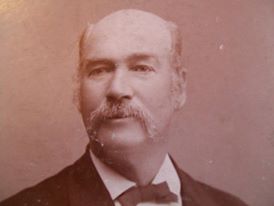Winslow Farr Jr.
(1837-1914)
Winslow Farr Jr. was born May 11, 1837 in Chesterfield, Vermont. He was the son of Winslow Farr, Sr. and Olive Hovey Freeman.
Two of the very first missionaries for the Church, Orson Pratt and Lyman Johnson were preaching in Vermont. Winslow Farr, Sr. and two of his sons attended one of their meetings and were so impressed with their message that Winslow invited them to stay overnight at his home. There Orson Pratt met Winslow’s invalid wife who was seriously ill and not expected to live long. They discussed the Gospel and Winslow asked Elder Pratt to pray with them. Elder Pratt prayed earnestly for Olive Farr, that she might be healed. Arising from his knees, he went to her bedside and took the helpless invalid by the hand, asking her if she thought that God could heal her. She told him she thought He could if He wanted to. He said to her, “Olive, in the name of Jesus Christ, I command you to be made whole, and promise you that you shall live until you are satisfied with life.” She was healed immediately. She dressed herself and walked around her home singing praises to God. It caused such rejoicing, the family did not sleep that night. This miracle caused a great sensation throughout the whole region. The Farr family joined the Church in April, 1832.
Winslow Farr, Jr. was born to his family five years after his other had been healed and had become a member of the Church. He had three brothers and two sisters, all much older. He was a tiny baby when born. When he became a full-grown man he was over six feet tall and weighed well over 250 pounds.
Winslow Jr. emigrated to Utah with his parents in one of the handcart companies, arriving in the Salt Lake Valley in 1848. They settled in Big Cottonwood. There he helped his father work for other settlers as a farmer. In his journal he mentioned many times working for “Brother Brigham.” He moved to Ogden and there worked at the ZCMI or the Co-op as it was called. Winslow played the violin very well, a talent that was self-taught. He played for all the dances throughout the valley and later, when in Mexico, he continued with his playing for all the dances. He was a good dancer and loved to join in the dances as well as play for them. He was a good natured man and was said to have the “patience of Job.” Winslow would never kill snakes, but would carry them away from his land and turn them loose. He did not believe in loud laughter and even though he was jolly and good natured, was never known to laugh loudly.
In 1859 he married Emily Covington. She bore him 16 children, but only six of them survived. His second wife was Melvina Bingham. They were married May 12, 1873 and were the parents of 11 children. His third marriage was to Matilda Halverson, December 11, 1879. They had five children, making a total of 21 living children.
Winslow Farr was a Bishop in Ogden and was among the Saints who were sought out by the U.S. Marshal for not complying with the Edmunds-Tucker Law. At one time while he was a clerk at the Co-op, the officers came to the store to arrest him. The other clerks warned him and devised a plan. They put a chair in a large piano box, sat Winslow on it and crated him up writing “Handle with Care” on the box and carried him right past the officers and home in the box. He later gave himself up and was sentenced to serve in the penitentiary at Salt Lake City. There were many other Church members and officers serving sentences at the same time, including Brother George Q. Cannon. While there, he kept busy making walking canes for many of the General Authorities and yarn pillow covers and table scarves for his family. He was released after six months, after which time, with his families, he started for Mexico.
On their way to Mexico they stopped several times and made temporary homes. Near the southern border of Utah, he preached to the Indians through an interpreter, telling them about their forefathers as told in the Book of Mormon. They were very receptive and begged him to come back and teach them again.
Winslow Farr Jr. was the first Bishop in Colonia Dublan (1891). Altogether he served as Bishop for 25 years. Soon after he arrived in Dublan, he called a meeting and the Saints voted to build a meeting house out of adobes. The building was 56’ by 26’.
Brother Farr was made vice-presidente in the town. On two different occasions he met with government officials to try to get them to let Mormons organize a form of protection for their people. When the uprising began in Mexico, Winslow and his families came back to Utah and with his brother, Lorin Farr, worked in the temples for many years. He died February 15, 1914 and was buried in Ogden, Utah
Mr. and Mrs. Joseph C. Clayson
Stalwarts South of the Border, Nelle Spilsbury Hatch, page 185
Winslow Farr Jr. made several trips from Colonia Dublan traveling back to Ogden. During one trip he brought his brother Lorin Farr(known as the father of Ogden) back to Dublan with him. He left Dublan for a final time in 1906. You can read more about Winslow Farr Jr at the Winslow Farr Sr. Organization website.

